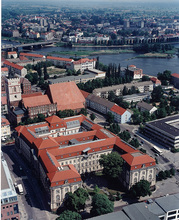More about the contents of VSU 2011

Topic, Focus, and Objective
The Viadrina Summer University 2011 addresses the political, social, economic, and cultural changes which profoundly affected the transformational societies in Central- and Eastern Europe during the past 20 years after the final collapse of the Soviet Union in 1991.
In the early years of post-communist transformation there was a widespread expectation that the countries in Central and Eastern Europe (CEE) would follow the Western societal model by introducing political democracy, the rule of law and principles of market economy. The experience of twenty years of post-communist social change reveals, however, a rather differentiated picture: In the new member-states of the EU, like Poland, Estonia, Hungary or Slovenia, institutions of liberal democracy have been successfully introduced. Contrary to that in Post-Soviet countries, like Russia, Ukraine or Belarus, one finds today hybrid or authoritarian regimes. Furthermore, even the term “democratic consolidation” which has been widely used to characterize the political developments in the new EU member-states, has turned at least questionable due to recent trends in these societies: Growing right-wing populism and nationalism, waning support for and shrinking confidence in democratic institutions; diminishing democratic participation among the public-at-large. Social science research has taken these trends seriously; consequently there has been a shift away from the normatively oriented Transition to Democracy Studies which have made up the research main-stream in the 1990ies. Today there is a profound interest in the study of functional problems of post-socialist democracies, and there is a strong focus on the analysis of stabilizing factors for hybrid and neo-authoritarian regimes.
The shift to market economy has also produced – similar to political change – fairly unexpected results: Post-Communist spaces are clearly marked by an impressive array of different economic orders. This socio-economic situation is currently described either in terms of “Varieties of Capitalism” or “Post-Socialist Welfare-States”.
These political and socio-economic developments in CEE countries have been influenced significantly by given cultural situations and processes: At one hand there are culturally inherited patterns of orientation and problem solving which are, at least partially, determining the political and economic behavior of elites and populations. At the other hand, the rapid societal transformations have their own impact on existing cultural traditions and orientations.
Questions of collective memory, national identity building and politics of history play a vital role in this respect. Political liberalization in Central and Eastern Europe opened a real chance for public debates on for long suppressed questions of national and regional history; democratization made it possible for civil society actors to claim their rights of participation in political life. At the same time there are in different countries peculiar and specific conditions regarding forms of public involvement in debates about historical narratives and collective memories. To make reference to history has become a political tool in the public discourse being purposely used by various societal actors.
The Viadrina Summer University 2011 will offer a systematic overview over typical political, socio-economic and socio-cultural situations and problems in Post-Communist Societies. The Summer School will focus in a special way on countries of Eastern and Central-Eastern Europe. Two topical Core-Courses make up the frame-work for the entire Summer School: One Core-Course is dealing with cultural legacies and the political role of historical memories; the other Core-Course is focusing on the development of political regimes and on the foundation of socio-economic orders. These Core-Courses will be supplemented by special seminars, lectures, round-tables, and work-shops etc. on issues like gender relations, migration and minorities, religiosity in society. Participants of the Summer-University 2011 will learn about the theoretical and methodological foundations of studying Post-Communist societies, and they will be acquainted with the current research situation in this academic field. Students will benefit from a wide spectrum of teaching and research formats ranging from comparative analysis to special case-study approaches. Academic formats will be supplemented by excursions and discussions offering first-hand, daily-life experience of the region of Berlin-Brandenburg which has been profoundly changed over the past twenty years during Post-Communist Transformation.
The teaching program will consist of:
- Core course I: The role of history and cultural legacies in post-socialist politics
- Core course II: Postsocialist political regimes and socio-economic developments
- Seminars and workshops
- Excursions to Berlin, Dresden and Eisenhüttenstadt
- Leisure time activities.



